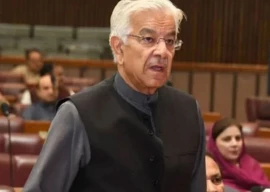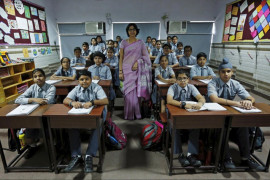
For an artiste who has been part of the Pakistani music circuit for two decades, Khalid Khan has witnessed the rise and fall of the music industry. The bassist, best known for being a former member of Aaroh, has played for a multitude of solo artistes including Najam Sheraz, and bands, such as Fuzön, Strings, Kaavish, Yataghan and Circle. But despite playing for industry heavyweights, he considers his first-ever stint on the music television series Coke Studio this year as special.
Speaking to The Express Tribune about how he was roped in to become a part of the house band of Coke Studio 7, he says, “I was working with Strings on the soundtrack for Jami Mahmood’s film Moor. It was after this collaboration that they offered me a chance to be a part of the house band of Coke Studio.” He cherishes the opportunity to perform alongside some of the most celebrated Pakistani musicians, such as Aamir Zaki, Sajjad Ali and Humera Channa.

One maestro he always wished to perform with is the legendary Abida Parveen, a dream that came true at Coke Studio. “I had always hoped to perform with her and Coke Studio helped me accomplish that,” shares the musician. Singing praises of artistes Asrar, Jimmy Khan, Usman Riaz and Nasir Shahab, he dubs them as the ‘future’ of Pakistani music.
Khan emerged to the fore in 2002 as the bassist for the band Aaroh through Pepsi Battle of the Bands. He laments the dearth of such shows in Pakistan and termed platforms like Coke Studio and Cornetto Music Icons as the ‘last hope’ of Pakistan’s dwindling music industry. “Coke Studio is our best chance at reviving the music industry, which has been on the downswing for quite some time now. I was part of Cornetto Music Icons as well and some of the musicians were extremely talented, but none of them were promoted after the show,” he comments.
He feels that musicians need to take the initiative of resuscitating the Pakistani music scene. “I don’t like this new trend of releasing one or two singles along with a music video over a span of a year or two. Nowadays, musicians have stopped making albums, which, in my view, has inadvertently contributed to the decline of our music industry,” he holds. He also credits the downfall of the music industry to the lack of concerts. “There was a time when there used to be a lot of concerts, but the ongoing political situation doesn’t allow it anymore. Live performances are dead in Pakistan and with them, the artiste has also died,” he shares.
Ruling out the possibility of an Aaroh reunion, Khan says, “I was only doing it for [guitarist] Haider Hashimi and after his death, I don’t see it happening again. Farooq, the vocalist of Aaroh, continues to perform in the United States and I wish him all the best.”

He adds, “For now, I am doing the soundtrack for multiple TV serials, and composed and performed for the Pakistani version of children’s TV series Sesame Street, Sim Sim Humara.” Khan feels that the nascent film industry can salvage the declining music industry. “The rise of the Pakistani film industry is a blessing in disguise as it can save our music scene. Even in the recently released film Na Maloom Afraad, some of the songs were very good,” states Khan.
Published in The Express Tribune, November 13th, 2014.
Like Life & Style on Facebook, follow @ETLifeandStyle on Twitter for the latest in fashion, gossip and entertainment.
COMMENTS (1)
Comments are moderated and generally will be posted if they are on-topic and not abusive.
For more information, please see our Comments FAQ

































1714024018-0/ModiLara-(1)1714024018-0-270x192.webp)










He has been there much long ago before aaroh and his first appearance in mainstream music came as bassist for band called "Collage" with Faraz Anwar playing as guitarist for the band. Both were teenagers and good friends back then too.